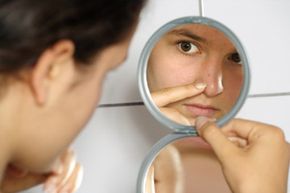If you ever want to hide your head in a paper bag because the pimple on the tip of your nose is bright enough to guide Santa's sleigh, you're not alone. The psychological effects of skin blemishes can be more serious than the physical effects. Many people who have frequent breakouts think their blemishes are more noticeable than anything else about them. This often leads to feelings of embarrassment and humiliation and to overall low self-esteem [source: American Academy of Dermatology].
If you have a few breakouts now and then, the good news is that people probably don't pay much attention to them. You might look in the mirror and feel like your blemishes are as noticeable as, say, a third eye, but unless you're a model or in another career where your appearance is scrutinized, it's likely that other people don't see your blemishes the same way you do. If your breakouts are more severe and occur often, however, people are more likely to notice them. But unless people are in very close proximity to you, they probably still won't see the blemishes the way that you do when you study your reflection in the mirror.
Advertisement
Of course, simply knowing your imperfections aren't attracting unwanted attention doesn't eliminate feelings of discomfort and embarrassment caused by having blemishes in the first place. Many doctors take the negative feelings brought on by breakouts very seriously, because they can lead to depression, anxiety and social withdrawal [source: Hanna]. In extreme situations, a distorted body image can progress to body dysmorphic disorder, a mental illness that causes people to obsess over perceived flaws, believe others single them out and go to great lengths to try to get rid of the flaws [source: Mayo Clinic].
If blemishes are affecting your social life, work or relationships in a negative way, it might be time to consult a dermatologist. There are a variety of treatment options available for breakouts, including over-the-counter products and prescription medications, and a dermatologist can help you decide what to do [source: American Academy of Dermatology].
While seeking treatment for blemishes can help boost your self-esteem, if you're plagued by the psychological effects of frequent breakouts and feel depressed or anxious about your appearance, you might want to consult your physician. He or she can suggest treatments ranging from counseling to antidepressants, depending on the type and severity of your symptoms [source: New Zealand Dermatological Society].
Dealing with blemishes is no picnic, but your breakouts don't have to control your life. If you think someone is staring at your blemishes, try holding your head high and flashing them a brilliant smile.
To read more about the psychological effects of skin problems and what experts say about the topic, check out the links on the next page.
Advertisement

